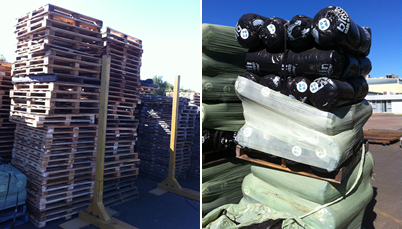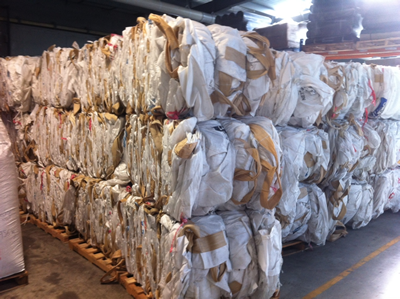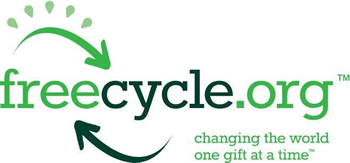 |
Perhaps no sector of infrastructure has benefitted more from the geosynthetics field than the global waste management industry. Throughout the world, increasing standardization in environmental protection for buried waste has led to the required use of geosynthetics in landfill base lining systems and often in caps. Because of this, the waste management field is commonly a developed nation’s most highly rated infrastructure sector.
But this success does not mean that the burial of waste should not be minimised. Recycling has played a fantastic role in the reduction of buried wastes and the reuse of materials for greener manufacturing life cycles. Plastic beverage bottles, for example, are commonly recycled and converted into products such as children’s playground equipment.
Our shared carbon footprint can be reduced even further. One way is through freecycling—the act of “recycling” what is destined for a landfill by giving it away to those who can still utilise the original materials. Geofabrics Australasia recently engaged in a highly successful freecycling trial in the Albury/Wodonga area of New South Wales, thanks to a strong freecycling organisation and the dedicated efforts of a Geofabrics employee.
EXTRAORDINARY RESPONSE
 |
Manufacturers engineer geosynthetics to meet various performance criteria of applications throughout the civil engineering field. Extensive testing programs verify these application-specific performance characteristics, such as strength, durability, and resistance to biological degradation. Together, these design and quality control measures have elevated the field of geosynthetics to the level of a discipline. (Dr. JP Giroud framed this discipline evolution nicely in a keynote lecture during EuroGeo 2012 in Valencia, Spain in September.)
But with geosynthetics being designed for and applied across so many sectors of engineering and construction, and with so many varieties of geosynthetics manufactured, there is an inevitable waste stream. Raw materials such as polymers are often shipped to manufacturers in bulk bags and on pallets, leaving considerable storage and handling-related waste. If the materials produced with a polymer supply do not meet the manufacturer’s stringent quality control standards, those materials are disposed of. Furthermore, construction site-specific configurations (e.g., each road authority may have a different road layout/design spec) and the need for roll cutting to match site layouts create additional waste. All of these extra materials would normally be destined for a landfill.
Geofabrics has at time kept scrap rolls, such as from geotextile production, out of landfills by offering these rolls to local volunteer fire groups, who have used them to maintain rural fire access tracks. Some horse arena owners have used scrap material as well. Another company has found a way to reuse some material in the production of jute-based erosion control blankets.
 So while Geofabrics has some history with finding partners to keep usable materials otherwise deemed “waste” out of landfills, nothing like the recent freecycle event had ever been seen.
So while Geofabrics has some history with finding partners to keep usable materials otherwise deemed “waste” out of landfills, nothing like the recent freecycle event had ever been seen.
Dave Kovacs, a laboratory technician with Geofabrics in Albury took up the gauntlet to steer geotextiles and other project-affiliated materials away from the area landfill. The issue was a perfect challenge for him: Dave is also a local freecycle organiser.
With his contacts in the 3800+ member community of Freecycle Albury/Wodonga as a starting point, and with the assistance of Geofabrics in Albury, he sent out word on the availability of non-returnable hardwood pallets, scrap geotextile rolls and bales of empty bulk bags.
“The response from the community was unprecedented,” Kovacs says, “with hundreds of people and community organisations coming to collect these free items — It felt a bit like Christmas!”
AT WORK IN THE COMMUNITY
How did the community put the materials to new use?
- Beechworth Correctional Facility collected truckloads of pallets. Some reuse options include using the wood in furniture-making mentoring programmes.
- The scrap bidim® geotextile rolls are now in gardens all around Albury/Wodonga performing a variety of functions including weed suppression in new veggie gardens and as water filters behind front yard retainer walls.
- Doctors and nurses at the Wodonga Hospital, many who live on area farms, were so impressed with the bulk bags that they returned to collect more.
- And the Local “Men’s Shed” collected pallets for their manly construction pursuits.
The uses that residents found for these materials have been extensive and at times quite creative. One man’s trash…. It has gone to show how much can be recycled, and how much does not even need to enter the waste stream to be recycled; it can be repurposed sooner with the help of individuals willing to communicate with their immediate community.
“In eight years of running the site locally, I’ve never seen such an enormous response to items being given away,” says Kovacs. “The result was so impressive that other local businesses have got involved or expressed their intentions to do so. All can see the obvious two-fold benefit of reduced waste to landfill and building good community relations.”
In a letter to his Geofabrics colleagues, Mr. Kovacs expressed his gratitude for the team’s willingness to serve as the guinea pig in this large-scale show of freecycling—what the Freecycle Albury/Wodonga group has referred to as a trial in “Industry Offers” to the community. The experiment has not only further raised the group’s profile, but yielded vital logistical information for how this type of community action can be implemented in the future with more participating companies and materials.
“A particular mention needs to go out to the guys in Albury stores, who admirably rose to the challenge,” Kovacs wrote in his post-event letter. They helped fine-tune the process along the way, such as coordinating the pickup times and donating time on normal lunch hours. “They provided a courteous and friendly service that left a significant community swell of appreciation.”
A large file of letters from the community stands as testament to the impact this wa
ste-saving event has had on bringing people together for positive action.
This story, and movement, is certainly far from over. Geofabrics looks forward to more opportunities to remain involved as the Freecycle initiative brings local attention to waste issues and inspires other local businesses to get involved.
HOW TO GET INVOLVED
Freecycle Albury/Wodonga is dedicated to reducing the local impact on landfill and building a strong, caring community in the process. They achieve this quite simply, by recycling (gifting) unwanted items to others. This group serves an area encompassing Albury/Wodonga and many surrounding towns.
If you do not live in the region, please check out http://www.Freecycle.org and find the group nearest to you, as Freecycle works best at a local level.











